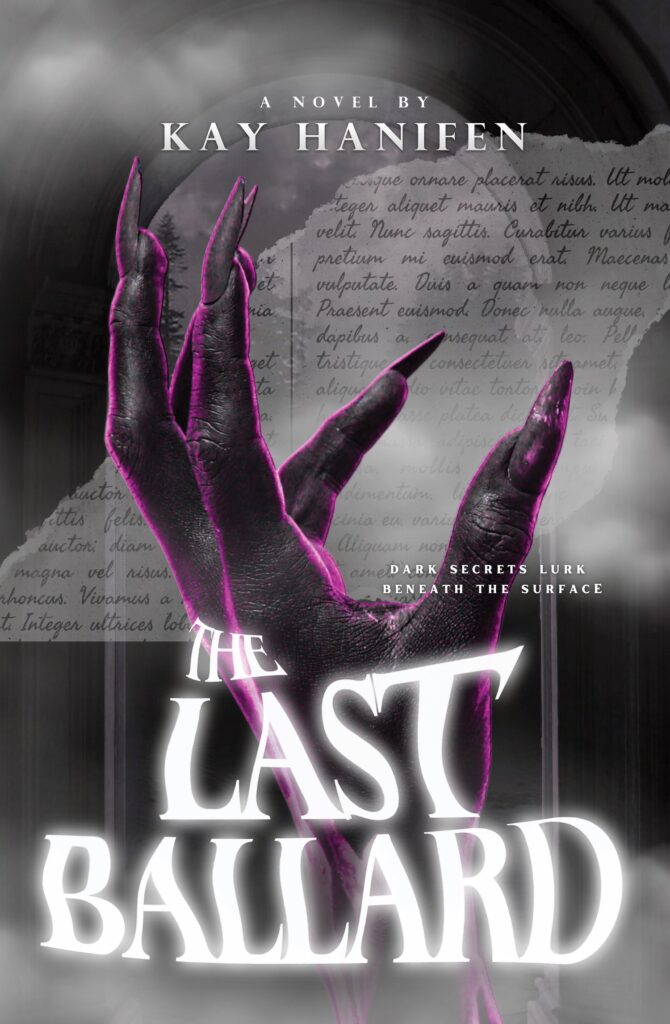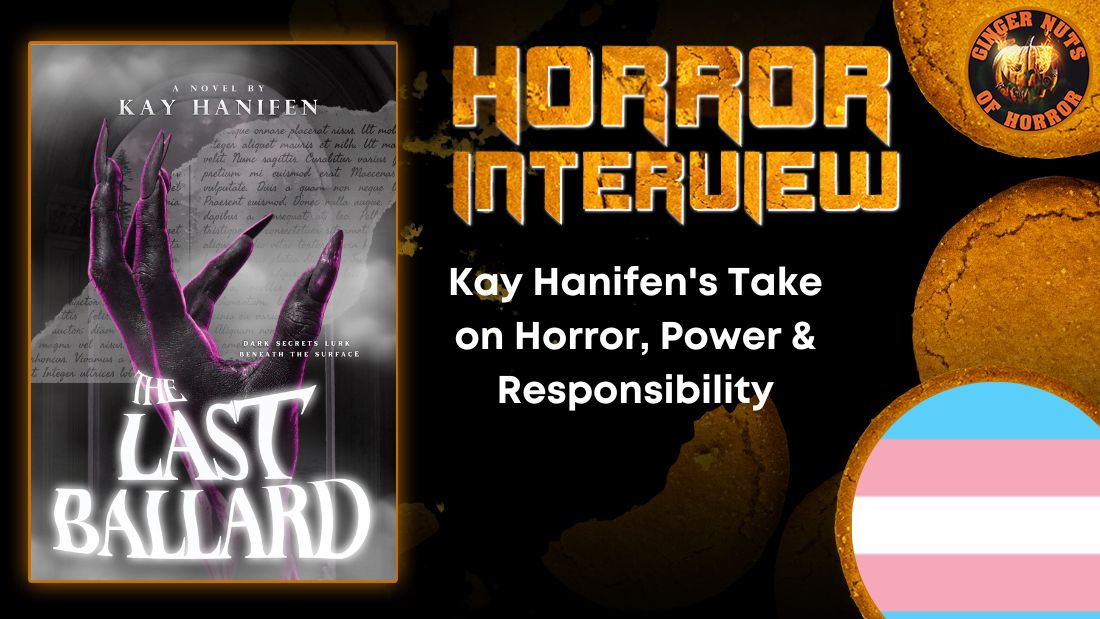
Meet Kay Hanifen, a dedicated writer whose passion for storytelling began in high school through the Centre for Fine and Performing Arts’ creative writing program. Kay has been published for over four years with a college degree in creative writing and a minor in publishing. Her debut novel, The Last Ballard, showcases her talent, while her editorial skills shone in the Christmas horror anthology, Till the Yule Log Burns Out. A devoted horror enthusiast and cat lover, Kay shares her creative journey and insights into the writing world. Discover her inspirations and experiences in this engaging interview.
Kay Hanifen’s Take on Horror, Power & Responsibility
Please tell the readers a little bit about yourself.
I’m Kay Hanifen, I have been getting published for around four years now (the anniversary of my first paid publication just passed), but I’ve been studying writing since high school, where I was a part of the creative writing program for the Centre for Fine and Performing Arts. In college, I majored in creative writing with a minor in publishing.
The Last Ballard is my debut novel, but I’ve been in a lot of anthologies and last year, was the editor/project manager for an anthology for the first time. Till the Yule Log Burns Out is an anthology of Christmas horrors with a wraparound novella that ties it all together. Along with being a massive horror fan, I’m a huge cat lover. I have three black cats at home named Bastet, Athena, and Edgar Allen Paw.
Which one of your characters would you least like to meet in real life?
Astrid from The Last Ballard, because she’s cruel and vindictive. I feel like she would try to tear down my confidence with all kinds of subtle insults and casual cruelty.
Which of your characters is your favourite?
I would say that, in my book, Rhea is my favorite character because I have spent the most time with her and getting into her head.
Other than the horror genre, what else has significantly influenced your writing?
Comic books and superheroes would be my second biggest influence. Before I really got into horror, I was and still am a big comic book reader. While horror is a lens through which I view the world (more on that in a minute), I would say personal philosophy when facing the world aligns more with superheroes. I firmly believe that “with great power comes great responsibility” and my novel, though it is horror, grapples with the same themes of power and responsibility, just with ghosts instead of capes.
The term horror, especially when applied to fiction, always has such heavy connotations. What’s your feeling on the term “horror”, and what do you think we can do to break past these assumptions?
Historically, horror has been seen as a “low brow” genre, but as someone who grew up loving so-called “low browed” comic books, I think the genre is unfairly dismissed. Horror is the funhouse mirror we hold up to society, warping and exaggerating features that have always been there. As problematic as the term “elevated horror” is, I think that people are beginning to see the genre’s importance and all the ways it can express the darker emotions we all feel as human beings. So, I think the best thing we can do to break these assumptions about the genre’s value is to take it seriously and study it like you would any other genre.
Should horror be political?
When has it not been political? All art is inherently political, but like I said, this genre is a funhouse mirror. We use it to reflect on ourselves and our darker sides, but we’re also shaped by the world around us. That includes politics, meaning that writers intentionally and unintentionally bring their politics into their writing. It’s inescapable, and this is where the idea of power and responsibility comes back into play for me.
This is a violent genre, and as writers, we have to be careful about where we direct that violence. I call it the Jaws effect, named for the fact that the film made it more acceptable to see sharks as monsters and kill them just for existing. A Jaws effect story is when a horror story has an unintentional negative effect on a vulnerable population.
Another example would be Norman Bates and Buffalo Bill, two serial killers who are explicitly not trans but do crossdress, leading to people associating trans people with these fictional characters. None of these authors set out to hurt a vulnerable population—in fact, Peter Benchley spent the rest of his life advocating for sharks—but they did. Horror is political, and as writers, like comedians, we have a duty of care to punch up instead of down.
Why do you think so many people enjoy horror?
It’s a bit like a roller coaster. You experience feelings of fear and danger in a safe environment and come out of it with a bit of catharsis. That’s what gets people into it. And then, they stay because the genre has a lot of power. We can say things in it that other genres cannot.
What, if anything, is currently missing from the horror genre?
People thinking critically about the implications of disability in horror. Equating beauty with goodness is a problem across genres, but in horror, it’s especially troubling. Body horror is an element of the genre, of course, but writers need to be more careful about using physical disfigurement or intellectual disabilities as a shorthand for someone dangerous, because it has real world implications. It forces people like Raymond Robinson, a man who was disfigured as a child and became an urban legend known as the Green Man and Charlie No-Face, further into the shadows. Like I said, horror writers should be focused on punching up instead of down.
What new and upcoming authors should we take notice of?
I really enjoy Hailey Piper and Cassandra Khaw’s work!
And who would be on your Mount Rushmore of horror?
Mary Shelley, Bram Stoker, Shirley Jackson, Stephen King, and Edgar Allen Poe would all be on my Mount Rushmore.
Are there any reviews of your work, positive or negative, that have stayed with you?
This isn’t anything published, but in the first semester of college, one of the guys peer-reviewing my essay for class wrote a whole letter about how it was perfect and how I’m a great writer. I saved that one to my computer in case I ever need a pick-me-up.
Also, this was one of my short stories rather than the novel, but I had someone DM me over Instagram to tell me that my story made him tear up on the subway. It was one of my favorites, so I felt heartened to know that other people were impacted by it.
What aspects of writing do you find the most difficult?
Revision is definitely the hardest for me, especially second and third drafts. My brain is always like I just wrote this? Why do I have to write it again? I have plenty of ideas all the time but refining them is when I struggle.
Does writing energize or exhaust you?
It definitely energizes me!
What’s your best advice for new authors about social media?
While it’s important to get your name out there, social media is not the most important thing in the world. It’s frustrating that authors—even ones who are lucky enough to have marketing teams for their books—need to be their own marketers. But the craft should come first. Put your work out there by focusing on submitting to publishers.
If you’re relatively active, people will find you. That said, unless you are doing an advertising push, I don’t think you necessarily have to post every day or put too much pressure on yourself. My other advice is to be genuine and nice, with caution, of course. You never know who could become a great lifelong friend but be wary of people who may have ulterior motives. It is the internet, after all. It’s a good idea to use best practices for online safety.
How do you balance making demands on the reader with taking care of the reader?
I think this also goes back to what I said about horror being political and writers having a duty of care. I make demands of my readers by questioning authority and society and by showing the ways that it abuses the marginalized. But I try to write with empathy, not just for the characters but also for whoever may be reading. Once it’s out there, I don’t know who is reading my work, so I try to handle sensitive topics with care.
Writing is not a static process; how have you developed as a writer?
By getting a romance novel ghostwriting job for a time, I definitely had to branch out into genres I am not comfortable with writing. Let’s say I have mixed feelings about the job as a whole, but making me step out of my comfort zone taught me a lot about finding my voice and balancing it with the desires of an audience whose tastes differ from my own.
What’s the most surprising thing you learned while writing your books?
I love doing research, so I’ll share a fun fact with you that relates to the book. Water Hemlock roots can easily be mistaken for carrots, and apparently taste delicious, according to foragers who misidentified the roots and survived eating them. This is because they’re in the same plant family.
What does literary success look like to you?
To me, success looks like my writing touching another person, hopefully for the better.
What is the best piece of advice you ever received regarding your writing?
This was from my Dad, but I internalized it at a young age. Writing is a skill and a discipline. You can have all the talent in the world, but you need discipline to finish your work, or no one will read it.
Do you have a favourite line or passage from your work, and would you like to share it with us?
It’s hard to choose just one, but this is from the second chapter: “All love stories are tragedies if you step back far enough. Even if the love is perfect and they stay together until they’re old and frail and barely recognize each other, one will eventually leave the other behind.”
Can you tell us about your last book, and can you tell us about what you are working on next?
The Last Ballard follows Rhea Ballard, the last in her family line. Six years after escaping her abusive grandparents, she returns home to their mansion for their funeral. When she does, she expects to field awkward questions, pay her respects, and put her past behind her. Instead, she discovers that she inherited everything. Now, she has to stay at the house while she puts her family’s affairs in order. Her presence reawakens the spirits of the house, though, and with the help of the family cook and the supernatural skeptic gardener, she has to solve a century old mystery and face the literal and figurative ghosts of the past before she becomes one herself.
Up next, in addition to sending out short stories and shopping around trunk novels, I’m working on an audio adaptation of Till the Yule Log Burns Out, which hopefully will be coming out in November.
If you could erase one horror cliché, what would be your choice?
Like I said above, facial disfigurements and different body types being used as shorthand for evil is one I would like to get rid of. I also am annoyed by useless horror husbands. So many plots could be prevented if men just listened to their wives.
The Last Ballard by Kay Hanifen

There’s more than one way to be haunted.
After the deaths of her abusive grandparents, prodigal daughter Rhiannon “Rhea” Ballard ends her self-imposed exile and returns home to the stately Ballard House for one last goodbye. She expects to pay her respects, field awkward questions, and let her family name die with her. But when she discovers that she had inherited everything, she must stay in the house and act as the caretaker while it is under probate to put her family’s affairs in order.
As she digs into her family’s dark secrets, the spirits of the house reawaken and her own traumatic memories resurface. With the help of the family cook, Morgan Reyes, an alluring woman with her own dark secret, and the supernatural skeptic groundskeeper, Andy Higgins, she must solve a century old mystery and put the spirits of the estate to rest before she becomes one herself.
On sale: June 23, 2025
Paperback & eBook
Amazon: https://a.co/d/gUtTIKj
B&N:https://www.barnesandnoble.com/w/the-last-ballard-kay-hanifen/1147409739?ean=9798992654905
Walmart: https://www.walmart.com/ip/16463117960?sid=6dfc6e00-7cf8-4601-a6f9-9dcb9cfdb4af
Kay Hanifen

Kay Hanifen was born on a Friday the 13th and once lived for three months in a haunted castle. So, obviously, she had to become a horror writer. Her work has appeared in over one hundred anthologies and magazines. Her first anthology as an editor, Till the Yule Log Burns Out, was published in 2024. Her first novel, The Last Ballard, will debut this year. When she’s not consuming pop culture with the voraciousness of a vampire at a 24-hour blood bank, you can usually find her with her black cats or at kayhanifenauthor.wordpress.com.
Instagram: https://www.instagram.com/katharinehanifen/
Further Reading
If you’re a fan of horror literature and cinema, then you absolutely need to check out the horror interview section of Ginger Nuts of Horror.
Firstly, the interviews feature a diverse range of authors, filmmakers, and horror enthusiasts, allowing readers to gain a multifaceted understanding of the genre. Each interview is an opportunity to explore the creative processes, inspirations, and personal stories behind the minds that produce some of the most chilling and thought-provoking works in horror today. From seasoned veterans to up-and-coming talents, the variety of voices ensures that readers can find something that resonates with them.
Moreover, these interviews often delve into the nuances of what makes horror such a compelling genre. Contributors share their thoughts on the psychological aspects of fear, the societal influences on horror trends, and the ways in which horror reflects cultural anxieties. This deeper exploration not only enriches one’s appreciation for horror stories but also fosters discussions about broader themes, such as identity, morality, and existential dread.
The interviews frequently touch on practical advice and industry insights. Writers and creators often share the hurdles they faced in their careers, tips for aspiring horror writers, and the realities of getting published or produced. This wealth of knowledge is invaluable for anyone looking to navigate the sometimes challenging waters of the horror genre. Readers interested in breaking into horror writing or filmmaking will find a treasure trove of wisdom that could pave their path toward success.
Lastly, the community aspect of Ginger Nuts of Horror cannot be overlooked. Engaging with these interviews allows readers to feel connected to a larger community of horror enthusiasts. Comment sections and social media interactions often follow, enabling fans to discuss their thoughts and engage with both the interviewees and fellow readers.
In conclusion, the horror interview section of Ginger Nuts of Horror is an essential resource for anyone interested in the genre. It provides rich insights, guidance, and inspiration that can deepen one’s appreciation for horror while fostering a vibrant community among fans and creators alike. Don’t miss out on the chance to delve into the minds of your favorite horror creators!


